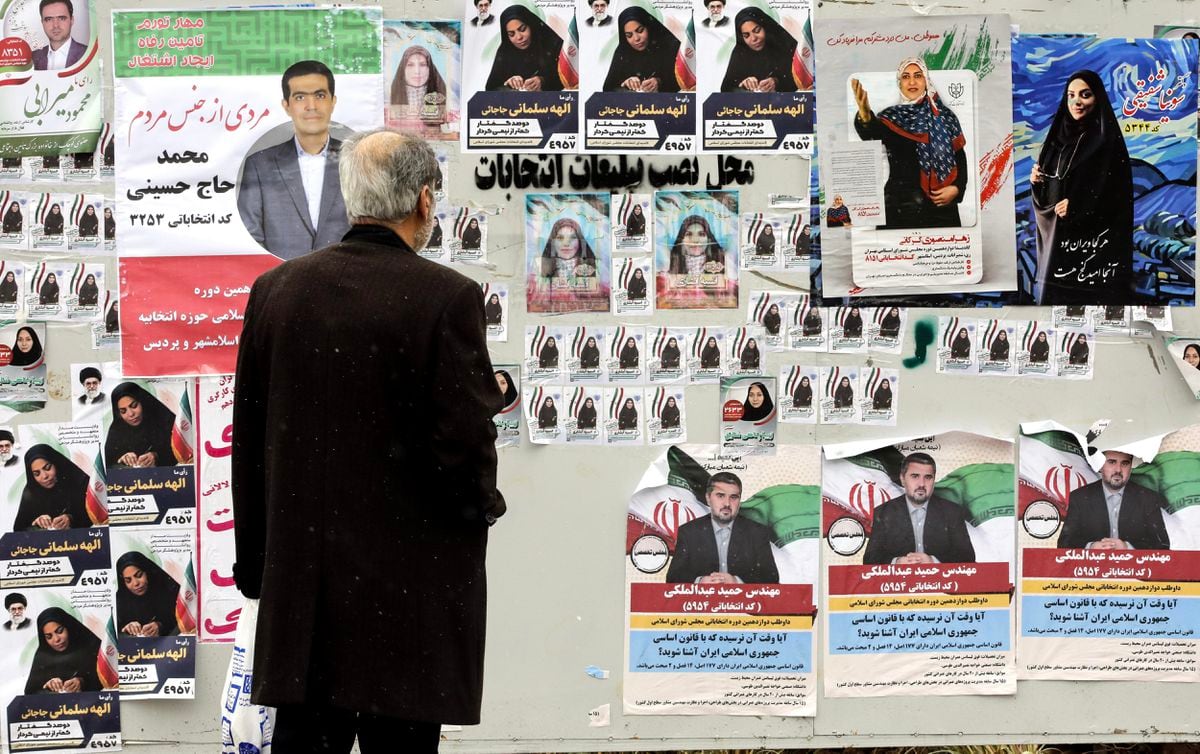In the City of Cosmonauts the urns have long ceased to interest.
It is a working-class and multicultural neighborhood in the municipality of Saint-Denis, on the northern outskirts of Paris where the communists held municipal power for decades and used to baptize streets and squares with names such as Lenin or the astronaut Yuri Gagarin.
Here the abstention record in the regionals in France on June 20 and 27 came as no surprise.
More information
The French right cracks the Macron-Le Pen duopoly
Record abstention in France regionals puts political parties on alert
Neighbors were not surprised, many of whom long ago lost the custom of voting, or never acquired it. Nor did it excessively shock Céline Braconnier, a political scientist who has been kicking the City of Cosmonauts for 20 years, a microcosm of a trend in France and in part of modern democracies: the drop in participation and the lack of interest in electoral democracy.
“On Sunday, as in every poll, there was very little voting in this neighborhood,” notes Braconnier, director of the Saint-Germain-en-Laye Institute of Political Studies and co-author with Jean-Yves Dormagen of
La démocratie de l'abstention.
Aux origines de la démobilisation électorale en milieu populaire
(The democracy of abstention. In the origins of electoral demobilization in a popular environment).
In a "democracy of abstention" the number of citizens of voting age who do not vote is higher than the number of citizens who vote.
If you want to support the development of news like this, subscribe to EL PAÍS
Subscribe
Braconnier explains that the participation in the City of Cosmonauts was 15% in the second round of the regionals, on June 20. Since General Charles de Gaulle founded the Fifth Republic in 1958, in no election has the percentage of abstention been as high in France as in these regions: 66.7% in the first round and 65.3 in the second. Two out of every three voters decided not to exercise their right to vote, more than 30 million.
After years of convulsions due to the rise of nationalism or populism, political passions that polarized societies, mobilized millions of voters and sometimes triggered participation, a phenomenon re-emerges that is neither new nor common throughout the world.
In several recent elections apathy has replaced anger.
Those who fed the anti-system vote ignore the process and swell the ranks of abstention.
Electoral college in Perpignan (France), this past June 20 during the first round of the regional elections.JC MILHET / Hans Lucas via AFP
"In democracies around the world, voters have become more cynical and detached from mainstream party politics in the age of social media," sums up Stanford professor Larry Diamond, co-editor of the
Journal of Democracy
and a researcher and
outreach worker on social media.
global trends in democratization. And he adds: “As a general trend, established parties have weakened and lost support, which has contributed to a decline in participation in some countries, although this remains high in many democracies and semi-democracies, an average of over 70%. this year".
Aburashid Solijonov, an expert at the International Institute for Democracy and Electoral Assistance (IDEA) and author of the report
Voter Turnout Trends around the World
, explains in an email that, since the 1990s, it has been observed a drop in everyone's participation. The decline has also been registered during the pandemic in most countries that have held elections in this period, although not in all. The United States set a record for participation in presidential elections in November since the early 20th century.
The drop in participation in France has coincided with other elections in remote parts of the world.
On May 15 and 16, six out of ten voters abstained in the constituent elections in Chile, where voting was compulsory until 2009. On June 13, in the election of regional governors, abstention was 80%.
And on June 18, Iran held presidential elections: less than half of the census participated.
It is difficult to establish a general trend considering the multitude of elections that are held each year, at different levels of government (national, regional, local) and in regimes that cannot always be considered democracies.
"The reason turnout has plunged in Iran is that elections have become completely insignificant there," says Diamond.
When looking for remedies, a theocracy like the Iranian is not the same as consolidated democracies.
The remedies, in these countries, range from compulsory voting, in force in Belgium and a score of democracies, to online voting, which is used in countries like Estonia.
At a time when citizens consume at the click of a button or manage their bank accounts with their mobile, it may seem anachronistic to veto voting online.
Its not that easy.
From the outset, it is doubtful that this method will serve to increase participation, according to Véronique Cortier, Director of Research at the National Center for Scientific Research (CNRS) and specialist in electronic voting protocols.
Measures against covid in a polling station in Toulouse, France, on March 15, 2020 FREDERIC SCHEIBER / Hans Lucas via AFP
Added to this are other problems, according to Cortier. “The main one,” he says, “is the transparency of the scrutiny. How can you be sure that your vote has been counted correctly? Cortier likens it to bank accounts. First difference: “If you protect your computer badly, do not monitor with your passwords and an attack occurs on your accounts, logically I would not mind, because there would be no problem with my accounts. On the other hand, if you, as a voter, have your account hacked, it affects me as a citizen ”. Second: “If money is stolen from your bank account, you will find out. In contrast, a successful attack on electronic voting is an invisible attack ”.
Today, Cortier explains, there is no electronic voting system that is sufficiently secure against internal or foreign manipulations, and at the same time capable of protecting secrecy and avoiding vote trading.
"Technically, there is work to be done," he says.
When asked if one day we will physically stop voting at the polling station, Cortier responds: “I don't know.
But why do it?
Why is it more modern?
There is no more secure and transparent technology, for now, nor more protective against intrusions and pressure, nor that inspires more confidence, than the ballot box, the ballot, the envelope and the booth.
Another option that arises every time abstention is triggered is compulsory voting.
In Belgium it has existed since 1893.
Jean Faniel, director general of the Center for Research and Socio-Political Information (CRISP) in Brussels, recalls that, after years of struggles for the right to vote for men over 25, the Liberal and Catholic parties in Belgium feared that the new workers and peasants voters elevated the socialists.
The solution: force everyone to vote and thus prevent only the most motivated from mobilizing.
"For this reason," he says, "compulsory voting was imposed, so that the 'good citizens', if it can be said that way - the bourgeoisie or rather intermediate classes - could counterbalance the perhaps a little more radical wills of the workers" .
More than a century later, in Belgium abstention is usually between 10% and 15% and, although there are penalties for not voting, their application is not always strict.
"Mechanically, compulsory voting is a solution that allows us to fight against abstention," says Faniel.
"People go to vote and, although it is not necessarily for pleasure, they are forced to reflect at least two minutes on who they will choose."
If elections were a market, abstention would reflect a supply and demand problem.
The problem of demand can be visible in the apathy of voters, but also in the obstacles to voting, as has been seen in the United States over the decades with the conditions to exercise this right that sought to diminish in some parts of the country. country the vote of minorities, especially Afro-American.
At the same time, there is a supply problem.
The political scientist Braconnier speaks of the "political disenchantment of the most economically fragile citizens who have seen political alternations take place that had no real impact on the difficulties of everyday life."
"It is more difficult to make people vote in these popular circles," he adds, "when they have the impression that voting is useless."
It is not surprising that the abstention in the French regionals, with nothing transcendental at stake in appearance, is tempered by a participation of more than 70% in the presidential elections, where voters believe that there is much more game and that this affects their lives.
And yet, even in the presidential elections the figures are lower in neighborhoods such as the City of Cosmonauts than in the average of France.
“It is still a territory”, explains Braconnier, “representative of the popular neighborhoods where national abstention records are broken. Here the population accumulates difficulties: there are fewer graduates, it is more economically fragile, the unemployment rate is high in particular for young people and they are young voters. Abstention factors accumulate ”.
And abstention, Braconnier argues, ends up affecting public policies, which serve more those who vote regularly - older, more qualified, with more economic stability - than abstentionists.
"We don't know how to get out of it," he says.
"If public policies are not directed at young people, they feel more abandoned and vote less."
An endless circle.
In the City of Cosmonauts - with its uniform blocks from the sixties, its streets dedicated to the Soviets Valentina Tereshkova or Vladimir Komarov, but also to the Americans Alan Shepard and Virgil Grissom - the message could be similar to that of the
Apollo 13
spacecraft.
sent to the control center in Houston: "Democracy, we have a problem."
Subscribe here
to the weekly Ideas newsletter.








/cloudfront-eu-central-1.images.arcpublishing.com/prisa/7342TRC63KUY2C2BJRV5Z5CBEA.jpg)
/cloudfront-eu-central-1.images.arcpublishing.com/prisa/NFJ4WIJE5VH37NB3W7TPRSICEI.jpg)